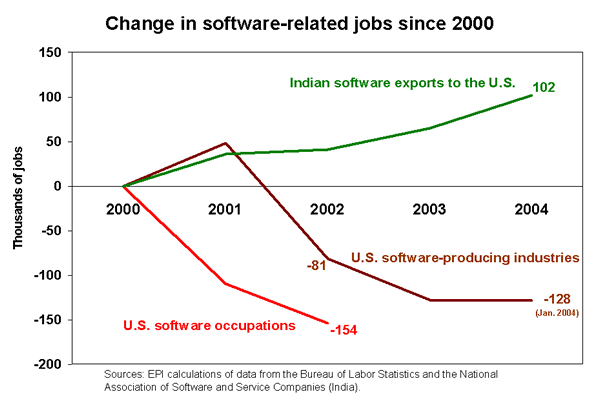See Snapshots Archive.
Snapshot for March 24, 2004.
High-paying software jobs being moved abroad
Software jobs, which pay some of the highest wages in America, have fallen sharply since 2000. These jobs have disappeared despite the fact that software sales to U.S. businesses in 2003 were up 4% over 2000. Comprehensive data on the number of U.S. software jobs that have moved overseas is hard to come by, but persuasive indirect evidence points towards the significant movement of software jobs to India (the most prominent of many countries to which U.S. software work is being moved).
There are two ways to look at software employment: software-producing industries and software occupations. Software-producing industries (software publishing, custom software and computer systems design) employ many people who actually work in non-computer occupations, like sales or accounting. On the other hand, software occupations (e.g., programmers and software engineers) are also found in a range of other industries, such as finance, manufacturing, and professional services.

Domestic software-related jobs, however measured, have declined significantly in recent years. U.S. jobs in software-producing industries declined by 128,000 (10%) between 2000 and 2004, while jobs in software occupations shrank by 154,000 (5%) from 2000 to 2002 (the last year data were available).
The story in India is quite different. In February, India’s industry association of software and related companies (NASSCOM) published an analysis of recent trends indicating that the professional jobs in India’s software export sector rose by 150,000 from 1999 to 2003. Given that 67.7% of its software exports go to the United States, this growth implies that Indian software jobs servicing the U.S. market have increased by roughly 100,000 over the last four years.
The NASSCOM report also indicates that its two largest customers abroad are in the banking, financial services, and insurance industry (39% of exports) and in the manufacturing industry (12%). Both industries have traditionally employed many people to produce software in-house. Increased movement of work overseas that had been formerly done in-house at these companies may explain why U.S. jobs fell by 154,000 in software occupations but only 81,000 in software-producing industries between 2000 and 2002.
The loss of software jobs lands an especially hard blow to the U.S. labor market because of their high quality. Software-producing industries and software occupations pay exceptionally high salaries. Annual salaries in all private industries averaged $36,520 in 2002, while salaries averaged $99,425 for workers in the software publishing industry, $76,051 in the custom software industry, and $75,568 in the computer systems design industry. Salaries for software occupations averaged $65,200 in 2002. Perhaps most disturbing, faster-than-average job declines occurred in the two highest paid software occupations: computer and information systems managers and computer information scientists.
This Snapshot was written by EPI Research Director Lee Price and EPI economist Josh Bivens.
